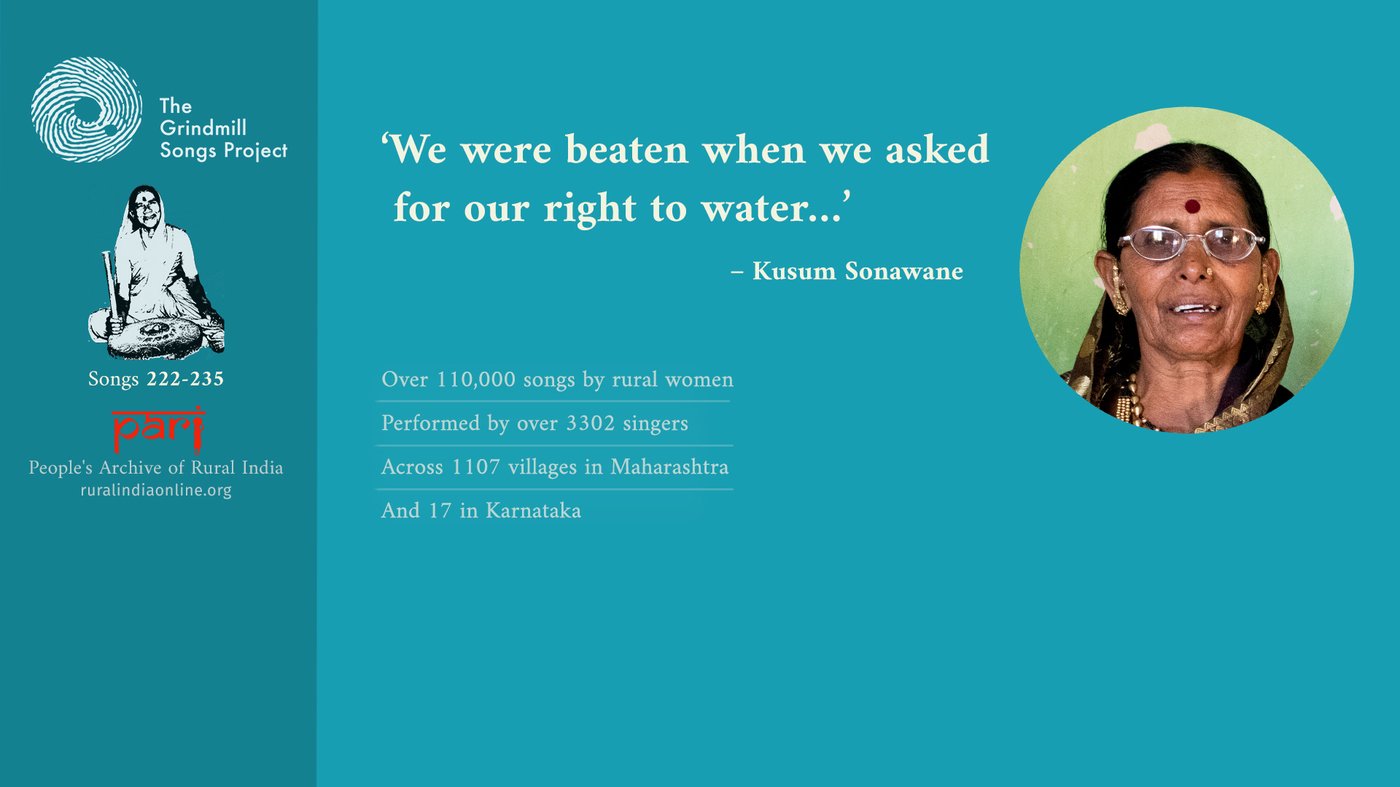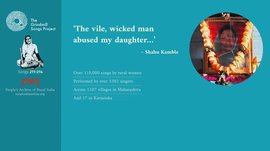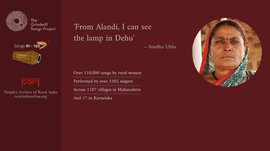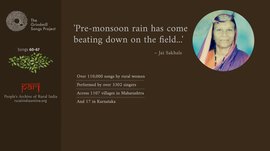The Grindmill Songs Project celebrates the birth anniversary of Dr. Babasaheb Ambedkar with a video in which Kusum Sonawane and others from Nandgaon village sing 14 ovi about the Mahad satyagraha
At the Chavdar Tale, just for the right to a sip of water
A crowd has gathered for the sake of women and children
March 20, 1927: Babasaheb Ambedkar drinks water from the Chavdar Tale (tank) of Mahad in the Kolaba district of the then Bombay Province – and leads nearly 3,000 others who also do the same. With that, the social taboo forced on the Dalits by upper castes – banning them from drinking water from a public resource – was challenged and broken.
March 20, 2018: Justices Adarsh Kumar Goel and Uday Umesh Lalit issue this order: if a complaint is filed against a public servant under the Scheduled Castes and Scheduled Tribes (Prevention of Atrocities) Act, 1989, a public servant can be arrested only after an inquiry has been conducted by a senior officer and only after he/she sanctions the filing of the complaint. With that, widespread protests begin by Dalit and Adivasi groups across India over what seems a dilution of one of the most important laws protecting them.
March 20, 2018: Grindmill songs performer Kusum Sonawane and her companions return to their homes in Nandgoan village in Pune district’s Mulshi taluka . “We couldn’t reach the Chavdar Tale this year,” Sonawane explains. “Our gaadi [vehicle] broke down halfway to Mahad [four hours away], and then it was too late, so we headed back home on a state transport bus.”
On March 20 every year, a group of people from Nandgaon village go to Mahad to celebrate that historic event in the lives of Dalits. They first garland the statue of Dr. Ambedkar, and then drink water from the Chavdar Tale, emulating Babasaheb's actions in 1927.
The Mahad municipality (now in Raigad district) passed a resolution on January 5, 1924 that threw open all public amenities to all castes including the 'untouchables'. But this remained on paper. Until Ambedkar arrived in that town.
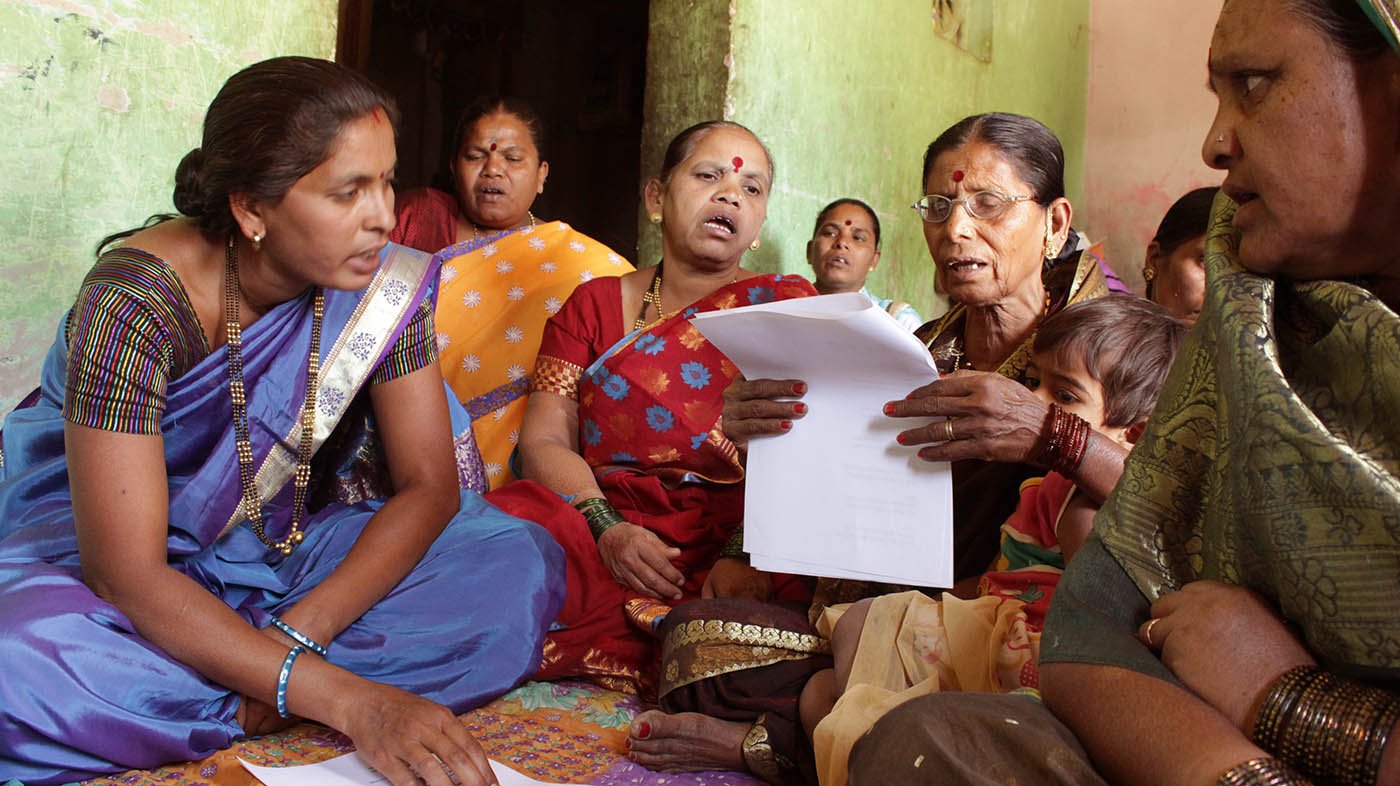
'We were beaten when we asked for our right to water', sing the women at Kusumtai's house in Nandgaon village
As Ambedkar was to write in his The Revolt of the Untouchables :
“The movement of the Untouchables against the injustice of the Hindu Social Order has a long history behind it, especially in Maharashtra. This history falls into two stages. Petitions and protests marked the first stage. The second stage is marked by the open revolt in the form of direct action against the Hindu Established Order.
“This change of attitude was due to two circumstances. In the first place, it was due to the realisation that the petitions and protests had failed to move the Hindus. In the second place, Governments had declared that all public utilities and public institutions are open to all citizens including the Untouchables…
“Of the attempts made to vindicate the right to take water from the public watering places, it is enough to mention the case of the Chawdar Tank.”
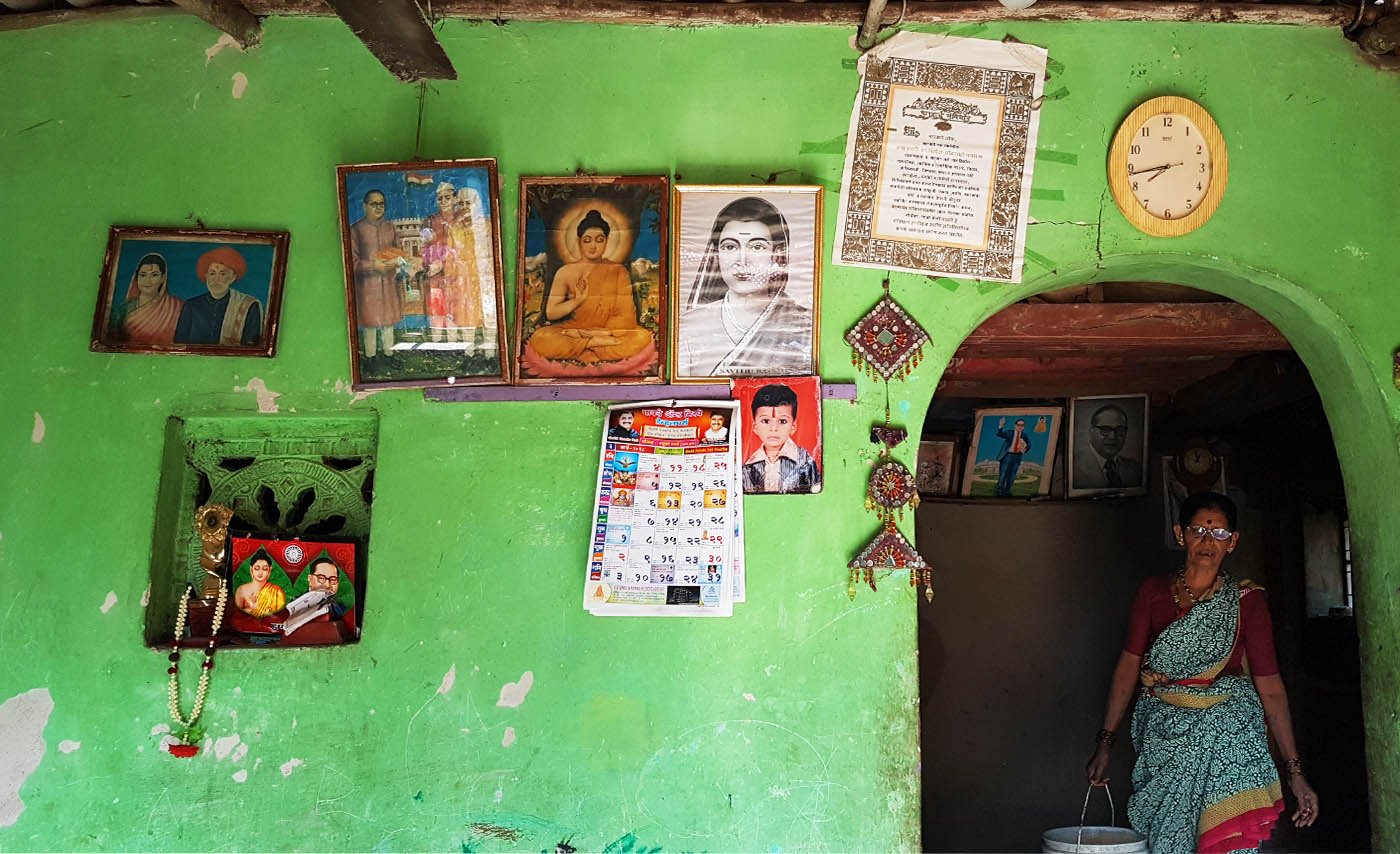
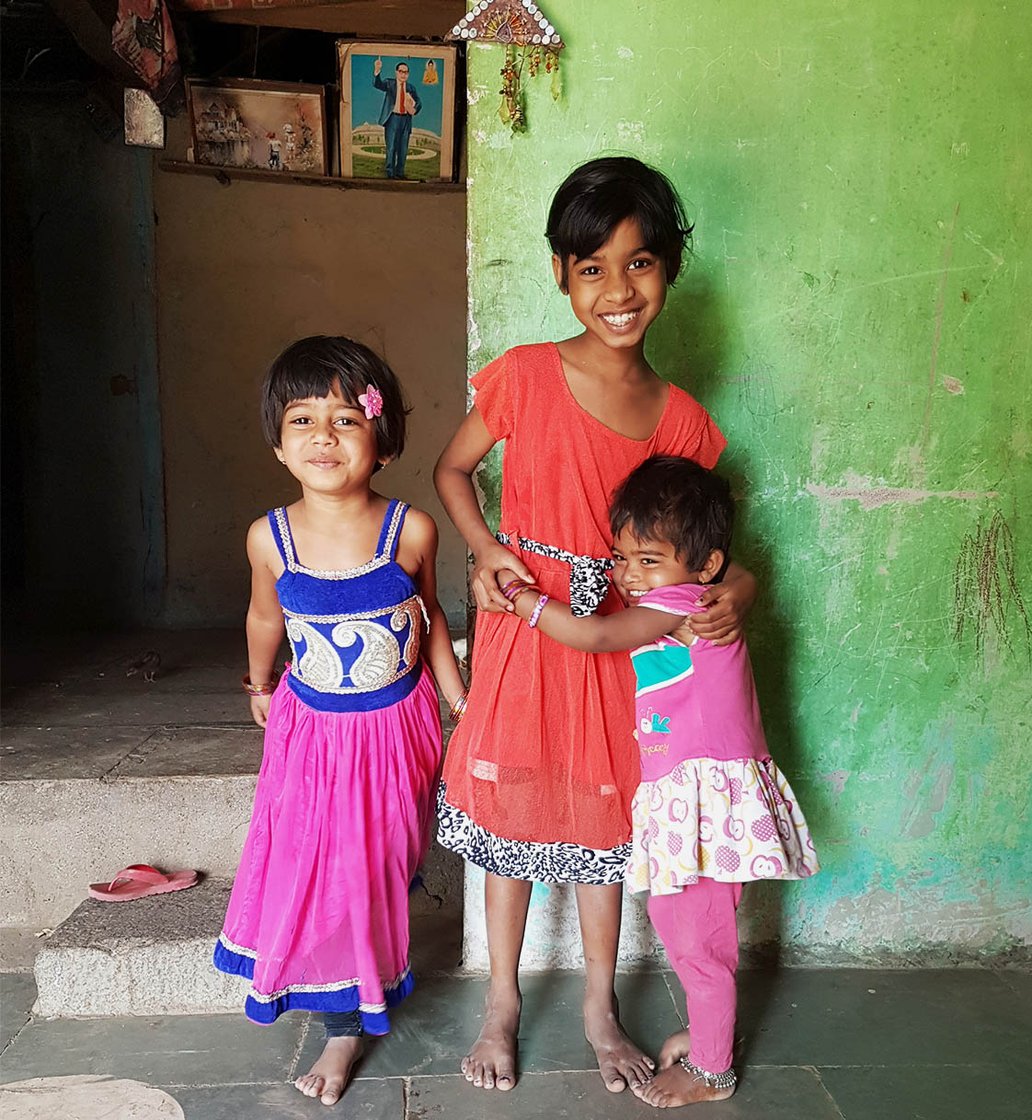
Left: Kusumtai's home is filled with images of Ambedkar, Savitribai and Jyotiba Phlule and Lord Buddha. A large print of the preamble to the Constitution adorns a wall. Right: Kusumtai's granddaughters – Ananya, Namrata and Pranjal
In the first couplet
,
a train’s steam engine roars through the forest announcing that Ramji’s son Bhim stands at the Chavdar Tale. In the second, the singer tells us that the candles that are lit in each of the train’s bogies are their sisters who went to the tank (in Mahad). The singer tells another woman: let us go to see the tank, to support Bhimai’s son [Babasaheb]. Dipping four fingers in the waters of of the Chavdar Tale gave them a unique joy, of feeling transformed. By touching the waters forbidden to them till then, they no longer feel ‘untouchable'.
And the singer tells us that Ramji’s son Bhimrao Ambedkar has enormous courage. In the fifth couplet, she says that a crowd has gathered to exercise their right to the water of the tank. In the next ovi , the singer tells us there is a flower garden over there, and it is here that Babasaheb's satyagraha took place. The act of drinking water from the Chavdar Tale symbolised the sense of equality that the Dalits felt, and this is reflected in the next line of the song – that Bhimai’s son, Bhimrao, “built a bungalow” there.
In the next five songs, from the eighth to the thirteenth, the singer highlights the hardships and oppression that Babasaheb and others with him experienced during the Mahad satyagraha . The orthodox upper caste Brahmins reacted by beating up the Dalits who dared to drink water from the tank. Even as they fought for their rights, they were hit with stones and pebbles. They were not afraid to fight for their rights, and they did not have even stale and dry bhakri to eat. They went from village to village spreading the word to people and felt they had Bhimraya (Ambedkar) with them.
In the last ovi , the singer sings that Bhimraya unfurls the blue (Bahujan) flag in Delhi and he stands out among the many leaders present.
Don’t miss these 14 ovi – see them performed in the video above, or listen to them in this audio clip:
आली आली आगीन गाडी ओरडली जंगलात
रामजीचं भीम बाळ उभं चवदार तळ्यात
आली आली आगीन गाडी डब्या डब्याने मेणबत्त्या
या बहिणी आमच्या साऱ्या चवदार तळ्याला गेल्या होत्या
बाई चवदार तळं, तळं जाऊया पाहायला गं
अशी भिमाई रायाला याला पाठिंबा द्यायला
अशी चवदार तळ्यावरी रंग देती चार बोटं गं
बाई रामजी च्या पुताचं याचं दीर्व्य (धैर्य) किती मोठं
अशी चवदार तळ्यावरी हाक पाण्याच्या घोटासाठी
जमली ती मैफिलं इथं बाया पोरा साठी
अशी चवदार तळ्यावरी आहे फुलांचा तो बाग गं
अशी भिमाई रायानी केला सत्याग्रहाचा त्याग गं
अशी महाडच्या तळ्यावरी पाण्याचा घोट तो रंगला गं
बाई भिमाई रायानी वर बांधला बंगला गं
असा खाईला मार हात पाण्याचा हक्का साठी गं
बाई कर्मठ जात इथं बामनाची मोठी
बाई झाला ना सत्याग्रह दगड गोटा चं खाऊनी
अशी आमच्या हक्का साठी पोरं पोटाशी घेउनी गं
अशी आमच्या जीवनाची आम्ही आशाचं नाही केली
आमच्या भीम रायाला याला साथ चं आम्ही दिली
अशी महाडच्या तळ्यासाठी आम्ही कदर नाही केली
बाया पोरना संगतीला, संग भाकर नव्हती ओली
गावा गावात जाऊइनी आम्ही मीटिंगा कश्या केल्या
पण आमचा भीमराया आमच्या संगतीला आला
यात कर्मठ जातीनी यांनी केलाना दगड फेक
भीमरायाच्या जोरावरी आमचा मिळविला हाक
बाई दिल्लीच्या तख्तावरी निळा झेंडा फडकला
बाई नेत्यामधी नेता भीमराया झळकला
Ālī ālī āgīna gāḍī ōraḍalī jaṅgalāta
rāmajīcaṁ bhīma bāḷa ubhaṁ cavadāra taḷyāta
Ālī ālī āgīna gāḍī ḍabyā ḍabyānē mēṇabattyā
yā bahiṇī āmacyā sāṟyā cavadāra taḷyālā gēlyā hōtyā
Bā'ī cavadāra taḷaṁ, taḷaṁ jā'ūyā pāhāyalā gaṁ
aśī bhimā'ī rāyālā yālā pāṭhimbā dyāyalā
Aśī cavadāra taḷyāvarī raṅga dētī cāra bōṭaṁ gaṁ
bā'ī rāmajī cyā putācaṁ yācaṁ dīrvya (dhairya) kitī mōṭhaṁ
Aśī cavadāra taḷyāvarī hāka pāṇyācyā ghōṭāsāṭhī
jamalī tī maiphilaṁ ithaṁ bāyā pōrā sāṭhī
Aśī cavadāra taḷyāvarī āhē phulān̄cā tō bāga gaṁ
aśī bhimā'ī rāyānī kēlā satyāgrahācā tyāga gaṁ
Aśī mahāḍacyā taḷyāvarī pāṇyācā ghōṭa tō raṅgalā gaṁ
bā'ī bhimā'ī rāyānī vara bāndhalā baṅgalā gaṁ
Asā khā'īlā māra hāta pāṇyācā hakkā sāṭhī gaṁ
bā'ī karmaṭha jāta ithaṁ bāmanācī mōṭhī
Bā'ī jhālā nā satyāgraha dagaḍa gōṭā caṁ khā'ūnī
aśī āmacyā hakkā sāṭhī pōraṁ pōṭāśī ghē'unī gaṁ
aśī āmacyā jīvanācī āmhī āśācaṁ nāhī kēlī
āmacyā bhīma rāyālā yālā sātha caṁ āmhī dilī
aśī mahāḍacyā taḷyāsāṭhī āmhī kadara nāhī kēlī
bāyā pōranā saṅgatīlā, saṅga bhākara navhatī ōlī
gāvā gāvāta jā'ū'inī āmhī mīṭiṅgā kaśyā kēlyā
paṇa āmacā bhīmarāyā āmacyā saṅgatīlā ālā
Yāta karmaṭha jātīnī yānnī kēlānā dagaḍa phēka
bhīmarāyācyā jōrāvarī āmacā miḷavilā hāka
bā'ī dillīcyā takhtāvarī niḷā jhēṇḍā phaḍakalā
bā'ī nētyāmadhī nētā bhīmarāyā jhaḷakalā
The train with a steam engine roars through the forest
Announcing: Ramji’s son Bhim is standing at the Chavdar Tale
The train has come, there are candles in each bogey
These are our sisters who had gone to Chavdar Tale
O woman, that Chavdar Tale, let us go to see it
And support Bhimai’s [Bhim’s mother] son
Dipping four fingers in the waters of Chavdar Tale, gives joy and a feeling of being transformed
O woman, Ramji’s son [Bhimrao Ambedkar] has such enormous courage
At the Chavdar Tale, just for the right to a sip of water
A crowd has gathered for the sake of women and children
At the Chavdar Tale, there is a flower garden
Bhimai’s son held a
satyagraha
there
At the [Chavdar] Tale in Mahad, the sip of water became so important
O woman, Bhimai’s son built a bungalow on it*
We were beaten when we asked for our right to water
O woman, the Brahmin caste here is very orthodox
O woman, stones and pebbles were thrown at us when we staged a
satyagraha
,
We were fighting for our rights, protecting our children
We did not expect anything in life,
We only went along with our Bhimraya
We were not afraid to fight for [Chavdar] Tale at Mahad
Women and children were with us, we did not even have stale
bhakri
to dip in water and eat
How we went from village to village and organised the meetings!
But our Bhimraya came along with us
The orthodox castes threw stones [at us]
With Bhimraya behind us, we got our right
O woman, the blue flag was unfurled on the throne of Delhi
O woman, there are many leaders, and Bhimraya stood out among them
Note: This water which even animals could drink freely, was forbidden to the Dalit community. Their fight for water, the Mahad satyagraha , was of tremendous importance. Taking a sip of water was a symbolic action. This movement based on humanitarian principles soon spread far and wide. Ambedkar’s 'bungalow', which the singers refer to, is a metaphor for his all-encompassing struggle for equality for Dalits.
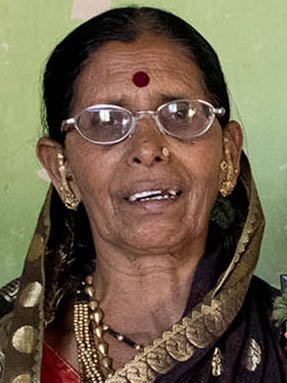
Performer/Singer: Kusum Sonawane
Village: Nandgaon
Taluka: Mulshi
District: Pune
Caste: Nav Bauddha (Neo Buddhist)
Age: 70
Children: Two sons and two daughters
Occupation: Farmer
Date: These songs, photographs and this video were recorded on March 25, 2018.
Poster: Sinchita Maji
